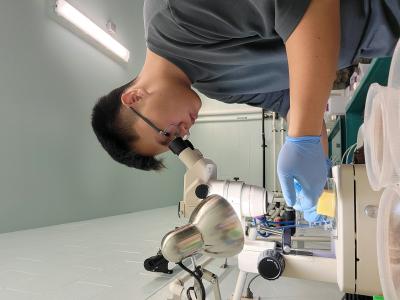 |
Junyu ZhangPosition/Title: M.Sc. by Thesis email: jzhang48@uoguelph.ca Phone: Office: ANNU 116
|
I finished my Honours Bachelor of Science degree in Animal Biology with distinction at the University of Guelph in 2022. In the final year of my undergraduate degree, I took Research in Animal Biology I (ANSC*4700) with Dr. David Huyben, and my project focused on the effects of feeding insect meal, pre- and probiotics, and short-chain fatty acids on zebrafish’s gut health and the transgenerational effects on the offspring’s survival. In the summer, I worked as a summer Research Assistant at Dr. Huyben’s lab where I performed DNA extractions on fecal samples from different fish species and assisted Carmi Riesenbach with chitin extraction from insect meal.
As a thesis-based MSc student in Dr. Huyben’s lab, I will continue my undergraduate research project and investigate the effects of feeding insects (black soldier fly), pre- and probiotics, as well as butyrate on the gut microbiome and survival rate of zebrafish.
Black soldier fly meal has long been of interest and considered as a sustainable protein source by the agriculture sector. Researchers in aquaculture are using it as an alternative to fishmeal because fish naturally consume insects, and it has high protein and lipid levels comparable to fishmeal. Recent studies suggest that feeding black soldier fly meal, probiotic and prebiotic yeast, and short-chain fatty acids may improve fish health, but underlying mechanisms are still unknown. Also, evaluating new diets on farmed salmonid fish is economically expensive and time-consuming.
My research will use zebrafish as a model to study fish’s responses to novel feed ingredients since zebrafish have fast development with reaching sexual maturity around 3 months of age, and can produce several hundred eggs per spawning. The objectives of my project are 1) to characterize the microbiome of zebrafish, and 2) to determine the microbiome response of zebrafish to different functional ingredients.
The feeding trial will be started in January 2023. We will feed adult zebrafish five diets formulated with fishmeal, black soldier fly meal, probiotic and prebiotic yeast, and butyrate for 6 weeks, and we will analyze fish’s growth performance by their feed intake and body weight and find how these ingredients change their gut microbiome.
Outside my research, my hobbies include playing ultimate frisbee and cooking.
